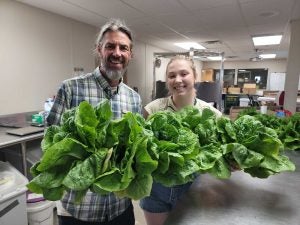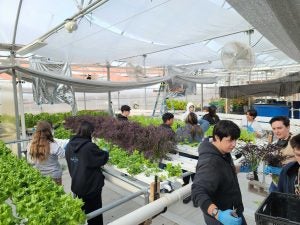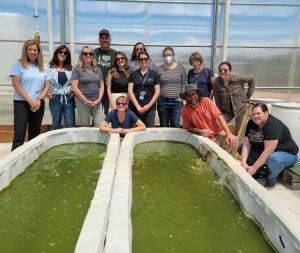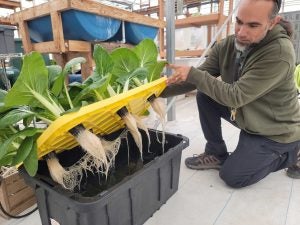At the Santa Fe Community College in New Mexico, agriculture is on the forefront of many students’ minds. The community college began offering courses focused on greenhouse production in 2014, and since then the program has grown into a multi-faceted, diverse program called Controlled Environmental Agriculture (CEA). Programs such as this offer students an opportunity to learn about cutting-edge technologies in modern day agriculture, where they can combine traditional growing techniques with more innovative options.
Charlie Shultz, academic director for the program, emphasizes teaching students the latest techniques and methodologies of agriculture to ensure a thriving future for the industry.

CEA (also known as indoor farming) is not a new field but has steadily gained traction and increasing investment money as more companies, particularly ones that focus on fruit and vegetable production, such as Gotham Greens and Bowery Farming, have seen the benefits of such innovations.
In response to this, Santa Fe Community College has been implementing classes where students can gain hands-on, direct experience in these types of agricultural systems: namely, hydroponics (the cultivation of plants in purely water systems) and aquaponics (a closed-loop system which combines aquaculture, the raising of fish, with hydroponics), the two most prominent systems being taught at the school. The college has invested a lot into its educational program, and in its position as a leader in aquaponics education will host the National Aquaponics Association Conference this year.
Beyond learning about cultivating agricultural projects, students may take classes and learn about energy systems, lighting requirements, HVAC systems, computer programs to control settings in a greenhouse, and many other aspects of CEA. The diversity in agricultural practices that Santa Fe Community College engages students in mirrors the diversity of the student body themselves, and there is almost a synergy between the students of various backgrounds and the innovative ways that these students learn and practice agriculture.

The college has approximately 4,000 students, with about 50 enrolled in the CEA program. Since its launch in 2014, CEA enrollment has steadily grown, even during pandemic years when the college’s overall student enrollment decreased by nearly 50 percent.
The students enrolled in the program come from various backgrounds, and Hispanic males, a group that is typically underrepresented in the agricultural sector, are a particularly large segment, making up nearly 50 percent of the students enrolled in the CEA program. Many students are also younger, including high schoolers enrolled in dual-credit courses as required in the state of New Mexico.
Shultz also spoke about recruiting underrepresented/non-traditional students through the New Mexico Cooperative Extension Service and the Indian Resources Development group. By connecting with these groups, Shultz ensures that the program serves as wide of an array of New Mexican residents as possible, from various ages, socio-economic levels, and ethnic identities.

Shultz promotes the CEA program further by expanding it to include more online classes in order to reach students who cannot afford the cost of in-person attendance in Santa Fe or are located in more rural areas of the state (26 of New Mexico’s 33 counties don’t have areas defined as urban).
When asked about how he sees the CEA program evolving, Shultz promises that students will have not just a green thumb, but also a “wet thumb” where they understand water systems, a “robotic thumb” where they understand computer programs designed to control greenhouse settings, and much more. After polling local agricultural industries in the region, Shultz also believes that specific skills are more desirable than generalized degrees. Offering bite-sized classes for desired skills — such as HVAC systems, microscopy, and water systems — can help students improve their hireability (or employability) to agricultural industries, Shultz said.
And through these niches (or what he calls “micro-credentials”), Santa Fe Community College hopes to support students who struggle with continuous education and often fail to complete a full degree program, whether due to financial burdens or other reasons. These students are typically minority and/or low-income, and Shultz hopes that these micro-credentials can offer them a way to work in agricultural industries while continuing their education, keeping them competitive and up-to-date with the latest skills and techniques in the agricultural sector.
The breadth of skills taught within the CEA program can drive its diverse student body to be leaders and innovators in the agricultural sector. Shultz said that approximately “a third of my students go on to become employees in CEA fields, a third continue onto higher education in plant sciences, and a third try their hand in entrepreneurship.”
With the future of agriculture changing due to shifting practices, climate change, and society’s perception of how food should be grown and eaten, the diversity of Santa Fe Community College’s CEA program is a positive indicator that the future of agriculture is bright and will bring diversity and innovation in some of the most dynamic ways.

Liza Thuy Nguyen serves as the 2023 American Farmland Trust Agriculture Communications Intern at AGDAILY, with a focus on helping to amplify diversity and minority voices in agriculture. Liza is originally from Anaheim, California, and attended the University of California, Davis, as a first-generation college student. She received a bachelor’s degree in genetics and genomics and went on to earn a master’s in horticulture from Penn State.





